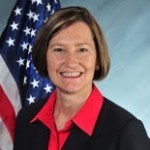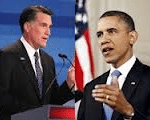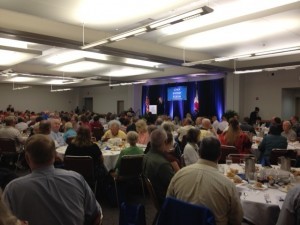
by | Sep 3, 2012
 (This is the second installment of a continuing series posing 3 questions to Republican candidates statewide)Â
(This is the second installment of a continuing series posing 3 questions to Republican candidates statewide)Â
Vicki Stogdill is running for the seat representing Senate District 18 in the Iowa Legislature. She has been campaigning hard for months to give this traditionally Democratic territory a new voice at the State House. Every race in the Iowa Senate this year is of utmost importance, and Stogdill’s effort to engage the voters of District 18 will reveal much about the Iowa electorate at large.  Voters both in and out of her district should take the time to check out her positions and background on her website, and to show her support in any way they can. She brings to the table a long career in small business and a host of new ideas to strengthen Iowa’s communities and economy.
Recently, Vicki was kind enough to sit down with The Conservative Reader:Iowa to talk about her campaign and answer three questions that will have a direct impact both on her constituents and the state of Iowa.
—————————————————– —————————————————————————————————-
1.) Nearly 28% of the voters in your district are not registered with either political party, what two things would you like these folks to know about you and your candidacy before they vote in November?
A. I ran as an Independent/NP candidate in 2008 – which demonstrates that I’m not afraid to stand up for principles before a party affiliation. I won’t support a bill that’s not good for Iowa, regardless of party recommendations.  I want to foster greater cooperation between the two parties. People are tired of the “partisanship†at our State Capitol, and I’d like to help minimize that. Instead of the two parties going to their “opposing corners†in a disagreement, I will attempt to sit down and discuss where there are differences and find common ground, without compromising on principle. I will put “people before politics.â€
B. I will self-impose term limits to allow more Iowans to have a chance to participate in the process. I want to bring my business experience, creativity and problem-solving skills to the Iowa Capitol and have a positive influence on improving the future of our State. Let’s bring fresh ideas and perspective to the discussion.
2.) Education is both an issue you are passionate about and one that will be front and center next session. What major reforms need to be implemented to improve results state-wide (and in Des Moines especially), and why should voters resist the urge to not make these changes?
First of all, I don’t claim to have all the answers on how to “fix†Iowa’s Education system. However, I believe one of the biggest keys to restoring our State to excellence in education is to restore more local control to school districts. I am also a strong proponent of giving parents more choices in educating their children, and to having the dollars “follow the child” in those choices.
Iowa should repeal the “core curriculum†mandates and instead offer recommendations which would allow local school districts to decide how and what to teach again. Locally elected school boards and administrators should make curriculum decisions based on the needs of their community, such as whether to enhance vocation programs for kids who do not choose a 4-year college after graduation, etc. The Iowa Dept. of Education should be downsized to serve as an advisory support agency instead of an umbrella. The State should continue to license and certify teachers. School districts should conduct annual assessments (such as ITBS) and scores should be published locally for taxpayers to see what kind of results they are getting for their investment. The State would only step in if a school district is consistently under-performing.
While technology and cutting edge learning must be a priority — we can’t lose sight of the “tried and true” teaching methods and foundational basics that have served us well in the past. And throwing out “old” methods just because they’re old isn’t necessarily progress. Teachers should have the ability to use their creativity again – to inspire kids to learn, with oversight from their local school administrators and school boards, instead of the State. Iowa must stop trying to mold each child into a cookie-cutter curriculum and teaching methodology that obviously isn’t working. Iowa should continue to reject “No Child Left Behind†mandates.
In Des Moines our test scores and drop-out rates demonstrate that local voters need to recruit better local school board candidates and then “clean house†at the voting booth. The results of our local schools are unacceptable at best, and it is not the job of the State to fix it – it is the responsibility of the community to demand it. Local taxpayers must hold their local school boards and administrators accountable. When searching for administrators, we should look first at the wealth of Iowa educators who are qualified to lead our schools – instead of conducting expensive searches to bring in out-of-state educators.  We have more than enough talented educators in Iowa who already know the landscape, challenges and history of our state.
A few other ideas that are worthy of consideration are to implement a dress code so students could focus on learning instead of fashion, which might also improve discipline and respect in our classrooms. We must also realize that it’s not the job of schools to “socially engineer†our kids—that task is the duty and responsibility of parents. In the Iowa Senate, I will work with educators, parents and the business community to arrive at recommendations which will prepare students for a career path after graduation. Iowans deserve better than what we’re currently delivering in Education, and I will work tirelessly to achieve positive results for Iowa’s kids, parents and taxpayers.
3.)Â Should you prevail in November and enter the Iowa Senate, what are the two or three votes you would most like to cast, and why?
While there are many bills I’m passionate about seeing passed – these three are among the most commonly suggested from my constituents, so they will be top priorities for me in the upcoming session:
A. Voter ID – because NOT verifying the identity of voters is unconstitutional – and my vote is disenfranchised when fraud is allowed to potentially cancel it out.
B.  Property tax reform – on all classes of property. For businesses, this will spur more expansion and investment which in turn will create more jobs when we stop penalizing the very engine of economic growth. For homeowners it will mean leaving more money in the pockets of those who earned it. For farmers, it will mean using a funding formula that doesn’t penalize them for success.
C.  Education Reform, as discussed above.
![2012 Debates Story Update: Fired and Disgraced Yahoo Bureau Chief Tied To Moderators Employers]()
by | Sep 3, 2012
 The news last week that recently hired Yahoo News Washington DC Bureau Chief David Chalian was fired for a truly unbelievable “hot mic†moment was bad enough–but digging into his background re-enforces the mess that likely awaits Mitt Romney and Paul Ryan come debate time.
The news last week that recently hired Yahoo News Washington DC Bureau Chief David Chalian was fired for a truly unbelievable “hot mic†moment was bad enough–but digging into his background re-enforces the mess that likely awaits Mitt Romney and Paul Ryan come debate time.
Chalian was fired for yucking it up with fellow reporters by saying that “They (Republicans) are not concerned at all. They are happy to be having a party while black people are drowning (Hurricane Isaac).â€Â You can hear the “hot mic†comment here along with the, almost as disturbing, huge laughs this got from the reporters he was talking to.
In an earlier piece, I made the point that the folks selected to moderate the three Presidential debates and the one VP debate were very concerning–and possibly incapable of approaching this crucial role objectively. This revelation regarding David Chalian should win over any of those who thought I was making too much of this story–here is why.
David Chalian’s Background
As noted by Tucker Carlson, Chalian was not a mere media foot soldier. He had risen through the ranks to become Political Director at ABC news (2007-2010), Political Editor for PBS NewsHour (2010-2012), and had just been hired as the Washington DC Bureau Chief for Yahoo News (November 14, 2011-last week). Not too shockingly, his professional accomplishments include an Emmy nomination for producing Charlie Gibson’s infamous Alaska interview with Sarah Palin in 2008. There is simply no chance that his personal hyper-partisan and crass political viewpoint did not come up in the private job interviews he had with the network brass that eventually hired him.
Worse yet is that, recalling the four news organizations who are supplying the moderators, two of Mr. Chalian’s former employers will be controlling the conversation in what will be the most watched debates in political history.
First, you have the PBS NewsHour.  This is both where Chalian had worked until last November as Political Editor and the home of Jim Lehrer who will moderate the first debate. Second, you have ABC News, where Chilian served as Political Director for three years. This news room is providing Martha Radditz as the moderator for the Paul Ryan vs. Joe Biden debate.
This is not to say that these moderators share the same despicable view of Republicans that Chalian was revealed to have, but what it does point to is the internal culture that thrives in these organizations. Simply put–there is a great chance that this bias not only exists in the other “journalists†who have climbed the totem pole at these networks, but that it will shine through one way or another in the upcoming debates.
Upon being hired by Yahoo News last year, Chilain did an interview in which he said working with Yahoo would provide, “an unparalleled opportunity to deliver high impact, high quality storytelling in what is shaping up to be a really consequential presidential election.â€Â Huh…I wonder what he meant by “high impact†storytelling?
((To read original story click here– “The 2012 Presidential Debates: When Moderators Aren’t Moderate†))
The post 2012 Debates Story Update: Fired and Disgraced Yahoo Bureau Chief Tied To Moderators Employers appeared first on The Conservative Reader.




by | Aug 27, 2012
 While the direction of the Country will be decided at the top of the ballot this November, the epic struggle for control of Iowa’s political landscape will be decided down ballot.
While the direction of the Country will be decided at the top of the ballot this November, the epic struggle for control of Iowa’s political landscape will be decided down ballot.
Of all the races taking place across the state, the long blocked agenda of Iowa Republicans is only two Senate seat gains away from being able to be implemented. Since the Iowa House is in no danger of flipping—the fate of this agenda lies in the Iowa Senate’s 26 open seats.
While anything can happen in these legislative races between now and November, this following analysis reflects where they stand today. Here is how we get from the 26 Senate seats up for grabs down to the 5 that will determine control of that chamber—and hence political control of Iowa for the next two years.
First things first: From 50 to 26 to 22
From 50 to 26— There are 50 seats in the Senate and all even numbered districts are on the ballot this year plus SD 49, which holds a race for a two year term before going back on the ballot in 2014. This means that there will be 26 seats in play, with the Democrats starting with an advantage due to having 13 of the hold over seats to the Republicans 11.
From 26 to 22— Of the 26 races, Republicans have fielded a candidate in all of them while the Democrats have let four seats go unchallenged (SD 2, SD 10, SD 12, and SD 20). This takes us from 26 possible races to 22 that will actually take place.
From 22 to 13— Of these 22 races, nine heavily favor* one party or the other. Four favor the Republican candidate (SD 40, SD 28, SD 6, and SD 4); while 5 favor the Democrat candidate (SD 50, SD 34, SD 32, SD 18, and SD 16).
*Note: This analysis is largely based on the past history of communities making up the districts, registered voter advantages, and money raised and on hand for each candidate. In all likely and leaner districts there are more than enough registered Independents to technically make up R and D registration advantages.
The Battle Field
From 13 to 5— This leaves 13 races left which will be heavily contested and which will draw the attention of, and funds from, the state political parties. Of these, I see five leaning Republican and 3 leaning Democrat– for Republicans they are SD 46, SD 38, SD 24, SD 22, and SD 14, and for Democrats they are SD 44, SD 42, and SD 8.
Of note here is that, for the time being, Senate Majority Leader Mike Gronstal is given SD 8 over Al Ringgenberg. Also, the best shot for Republicans in these Democrat leaners are SD 42 and SD 8, while Democrats look to have the best chance in SD 46 and SD 38.
The Final 5
The remaining 5 races can truly go one way or the other and are absolutely critical for control of the Iowa Senate. They are SD 49, SD 48, SD 36, SD 30, and SD 26.
Here is a recap of how we got there:
                                                                   Republicans         Democrats
                        Hold Over Seats                       11                        13       Â
                       Uncontested                              4                          0 Â
                         Likely R or D                            4                          5 Â
                         Lean R or D                              5                          3                                                    Â
                                                             ——————————————                                                             Â
                                                                           24                        21
Going Forward
As you can see from above, assuming my “likely†and “lean†numbers hold true, Republicans are in great shape to take the Senate as they only need to win 1 of the “final 5†races to tie and only 2 of the 5 to gain outright control. Conversely, Democrats would have to win 4 of the “final 5†for a tie and would need a clean sweep to retain control.
Two interesting facts here are that all the big action is in Eastern Iowa, which is home to all 5 of these decisive races, and that 4 of the 5 are contained in U.S Congressional District 1. This is further good news for Republicans as Ben Lange is a great candidate who seems to be gaining steam against a sputtering Bruce Braley.
In the coming weeks The Conservative Reader: Iowa will be featuring interviews with Republican candidates from across the state. Additionally, we will be taking in-depth looks at the 8 races which will be highly contested and the 5 that will be utterly critical for taking the Iowa Senate.
The voters in these 13 districts will ultimately answer the questions of how much property tax relief we receive, what reforms are made to our declining education system, and whether Iowa will set up health insurance exchanges for Obamacare. One thing I have no question about is that these districts are where the battle for ideological control of Iowa will be won or lost.
![2012 Debates Story Update: Fired and Disgraced Yahoo Bureau Chief Tied To Moderators Employers]()
by | Aug 23, 2012
 Lost in the sea of coverage following Mitt Romney’s selection of Paul Ryan as his running mate, was the news that the moderators for the three Presidential debates, and one VP debate, were also selected.
Lost in the sea of coverage following Mitt Romney’s selection of Paul Ryan as his running mate, was the news that the moderators for the three Presidential debates, and one VP debate, were also selected.
There is a certain kind of news one receives that falls into the category of “this may or may not be bad—but it can’t be goodâ€. For Republicans, learning of the moderators that will be at the helm for these four debates certainly earns this distinction.
In order of appearance they are- Jim Lehrer (PBS News Hour), Martha Raddatz (VP Debate-ABC News), Candy Crowley (CNN), and Bob Schieffer (CBS News).
Since the Romney campaign had to sign off on each moderator, it is hard to imagine that they could not have demanded better (even given that the Obama camp also had to sign off on each). By any measure, Jim Lehrer, Candy Crowley, and Bob Schieffer all lean to the left, and the networks that employ them all trail badly in the ratings to their direct competition.
Even if you were to say that these three were the fairest that both sides could agree to, giving a green light to Martha Raddatz for the VP debate was certainly inexplicable. The reason for this being, she is a “foreign affairs correspondent†which is not Ryan’s forte, and in fact he was brought into the race for his economic mastery. One has to wonder how much focus will be put on non-domestic topics just based on her area of expertise. On the surface this seems a major concession to the Obama campaign, and one that needed not be given.
The reason these moderators are so important is three-fold. First, with all the polls showing that the election has a likelihood of being razor-close, every small detail that goes into them has a chance to be huge. Second, like was the case with the Republican Primary debates, these four showdowns will smash records for viewership and the audience will include millions of Independents sizing up the candidates for the first time. Lastly, and most importantly, the questions asked of the candidates have the ability to dominate the crucial weeks of news cycles leading up to Election Day.
So What Should The Focus Be?
Poll after poll shows that for the American people ground zero in this election is the economy. A Pew Research Poll taken from June 7-17 asked voters to name the top issue that they will be considering in the voting booth in November. The top four answers were Jobs (35%), the Budget Deficit (23%), Health Care (19%), and Social Security (11%).
The danger in having biased moderators was on full display for the Republican Primary debate moderated by George Stephanopoulos, when, seemingly out of nowhere, he felt the need to drill down with Mitt Romney and Rick Santorum on the issue of female contraception. This gave birth (no pun intended) to the Sandra Fluke phase of the campaign and a multi-week sidetrack by the media away from the serious issues of the day. There is simply no doubt that, should they choose to, a moderator can actively push the focus to issues that are not widely being considered by voters—and into territory that favors one candidate or another.
As will be the case in October, it just so happens that the issues voters themselves say are paramount are the exact issues that President Obama is desperate to avoid talking about. In theory this would make the debates a huge opportunity for Romney and Ryan to drive home their message—something tells me it won’t quite go down that way.
Perhaps I will be proven wrong, but will these moderators have the gumption to ask President Obama why a myriad of the promises he made while running in 2008 have been unachieved or even un-attempted? Will they remind the American people that twice the President had budgets voted on by Congress, and he failed to receive one solitary vote for either of them? Will they ask why he promised to cut the deficit in half but instead oversaw three years of trillion dollar plus deficits? Or will they inquire why he has not laid a plan on the table for reforming entitlements, after saying himself this was crucial in 2008?
Republican Are Right to Be Nervously Skeptical
All things being equal, and according directly to the polls, the topics discussed during all four of the debates should almost exclusively be jobs, the deficit, the long term health of entitlement programs, and foreign policy. What I fear instead is painful subjection to multiple questions on gay marriage, abortion, contraception, and student loan debt— knowing all the while the fruit is rusting on the vine.
It is true that the level of professionalism that the four moderators will show is yet to be determined, and perhaps at least three of them will be fair (I hold no hope for Bob Schieffer). But given the track record of behavior the major media outlets have shown to Republicans in recent years, I’d say a mildly-crippling nervousness is more than justified.
After all, barring a phenomenal performance by both Republican candidates, one thing is certain—“it may or may not be bad…but it won’t be goodâ€.
The post The 2012 Presidential Debates: When Moderators Aren’t Moderate appeared first on The Conservative Reader.




by | Aug 16, 2012
 The following is an interesting study released recently, and the reaction by the GOP (written up by Jill J.).
The following is an interesting study released recently, and the reaction by the GOP (written up by Jill J.).
In a policy study released by the Public Interest Institute at Iowa Wesleyan College, author Amy Frantz analyzed Iowa’s teen unemployment situation. The report notes Iowa’s unemployment rate for teens has remained consistently high over recent history. Two subgroups are analyzed within the data: teens ages 16-19 and high school graduates 18-20 years old.
The report notes that the unemployment rate for the 16-19 year old group was at a very high 12.3 % in 2002 and over the course of the last decade has remained at the high level, with the most recent report for 2011 showing that the unemployment rate for 16-19 year olds was 13.8%. This is much higher than the overall unemployment rate in Iowa which was just below 6% in 2011. Similarly, the 18-20 year old high school graduate group’s unemployment rate was 9.6% in 2002 and has risen higher, peaking in 2010 with a rate of 19.3% before coming down below 18% in 2011.
Not only are the unemployment rates higher, but an analysis of the number of hours worked for these two groups has seen a reduction in the last decade as well. The average number of hours worked per week for the 16-19 year olds in 2002 was 12.5 hours, but has dropped to 8.1 hours per week in 2011. Again, the 18-20 year old high school graduates faced a similar situation wherein their average hours worked in 2002 was 21.1 per week, falling to 16.7 hours per week in 2011.
The study references the rise in minimum wage as one of the driving forces behind the tremendously high teen unemployment rate. Iowa’s minimum wage was raised by the Iowa Legislature and Governor Culver in 2007 from $5.15 per hour to $6.20 per hour, and then in 2008 it was raised to $7.25. The federal minimum wage was also raised by the Democratically-controlled Congress, up to its current level of $7.25 an hour, matching Iowa’s rate. The study links this rise of the minimum wage to the increase in teen unemployment rate, noting that “teenagers are five times more likely to earn the minimum wage than adults. Thus the impact of an increase in the minimum wage would be felt dramatically by that segment of the workforce.†Those most hurt by a rise in minimum wage are often the youngest and most unskilled workers as businesses cannot afford to pay increased wages for individuals that might not have the necessary training or productivity to bring to the business.
Lastly, the study proposes an idea on how to lower the teen unemployment rate in Iowa. The study proposes to create a “sub-minimum†wage for teen workers in the state, which would allow businesses to pay certain teens an amount below the minimum wage that would apply to all other workers. The study concludes with the observation that “The benefit of having a higher minimum wage is cancelled out if teen workers are receiving fewer hours of work. And for those teens that want a job but cannot find one, their wages are $0.â€

by Art Smith | Aug 10, 2012
 It may be a matter of opinion, but I was a bit disappointed with Wednesday’s Iowa Energy Forum‘s “A Conversation On Energy Luncheon” event at Hy-Vee Hall in Des Moines. A similar event was held by the group, which is sponsored by the American Petroleum Institute, last year (May 25, 2011). One might think that an event hosting two sitting US Congressmen (Leonard Boswell-D and Tom Latham-R) who happen to be running against each other in this year’s election would be an opportunity to have some real discussion about the issues impacting Iowa and American energy concerns, but compared to last year’s event this was a bit of a yawner.
It may be a matter of opinion, but I was a bit disappointed with Wednesday’s Iowa Energy Forum‘s “A Conversation On Energy Luncheon” event at Hy-Vee Hall in Des Moines. A similar event was held by the group, which is sponsored by the American Petroleum Institute, last year (May 25, 2011). One might think that an event hosting two sitting US Congressmen (Leonard Boswell-D and Tom Latham-R) who happen to be running against each other in this year’s election would be an opportunity to have some real discussion about the issues impacting Iowa and American energy concerns, but compared to last year’s event this was a bit of a yawner.
Last year we got a panel of experts from the Iowa energy industries discussing what’s actually being done to expand the development of various energy technologies, including a strong speech by Governor Terry Branstad, and gobs of data regarding energy production and consumption in Iowa.
This year we got mostly platitudes and commitments to vote for good energy policy.
Both congressmen had an opportunity to speak without hearing the other speak first and then answered a few written audience questions.
Leonard Boswell
Congressman Boswell was rather distracted at first with pointing out his military record, which was totally irrelevant to the topic, and although he proclaimed support for the Keystone Pipeline he hedged regarding the routing of the pipeline as the only obstacle for approval of Keystone. His message is essentially that we need “all of the above” solutions for energy independence, and that we need to upgrade the energy infrastructure including improvements to the electrical grid and expansion of natural gas fuling stations along the major interstates.
Boswell also made a point of discussing the impact of climate change on general infrastructure… he provided an anecdotal story about someone in Alaska that was showing him a location where the ground was dry and supposedly had 10 feet of ice many years ago. His punchline for this was that permanently frozen ground did not require digging foundations for supports, but now that areas of the country are losing their permanent frozen ground, those things built on them have to be rebuilt. Although I think the topic is worthy of discussion (and I give Boswell credit for not discussing the idea of human causality), I never got the connection to energy independence. Maybe I’m slow.
Tom Latham
 Tom Latham expressed the same support for Keystone sans concerns about the route. He made an excellent case for the fact that in the early ’70s, our leaders in Washington said we would never have another oil crisis because we would ensure that we had a fully independent domestic oil resource… but as soon as OPEC opened up the spigot we apparently forgot all that. 40 wasted years.
Tom Latham expressed the same support for Keystone sans concerns about the route. He made an excellent case for the fact that in the early ’70s, our leaders in Washington said we would never have another oil crisis because we would ensure that we had a fully independent domestic oil resource… but as soon as OPEC opened up the spigot we apparently forgot all that. 40 wasted years.
Not only did Latham attack Cap and Trade as ill conceived, he pointed out that the EPA was preparing to release a number of regulations the day after the election, each expected to cost Americans over $100 Billion, modeled after the failed legislation.
Latham also explained that with over $70 Trillion in long-term unfunded liabilities, expanding domestic energy production would bring the government tens of Trillions of dollars to fund those liabilities.
All in all, I appreciate both congressmen taking the time to share their thoughts about energy. I would rather (or additionally) had some Iowa specific information provided at the event like last year. Although the conversations with the congressmen were somewhat interesting and perhaps relevant to the upcoming election, the fact that the format was specifically non-partisan, non-debate, non-confrontational kept the whole impact very low. I’m not really saying it should have been an election showdown… I’m just saying I could have gone to the two candidates web sites to get the total information I got at the forum and used a much smaller part of my day to do it. I think this organization would do well to focus on promoting Iowa Energy production and the impact it is having on Iowa and the US.
The food was really good though. (grin)
The Playground
Probably the most interesting conversation happened outside the event while Boswell held his media availability. Short version is this: my friend Kevin Hall of The Iowa Republican had the “nerve” to ask the congressman whether he still supports Cap and Trade. This set off a firestorm of reaction from Boswell’s staff who could not believe the audacity of a mere “blogger” to represent themselves as “media” and ask the important man from Washington a question that doesn’t need to be asked.
Yes, that really happened.
I don’t want to spend the 10 ‘graphs that I have pent up inside explaining why this topic frustrates me (you’ll get them soon enough). It’s not worth the time right now, and keeping this to the “short” version, I just want you to know this was the most childish response I’ve ever heard to a hard question. It is to Congressman Boswell’s credit that he did not join in the behavior of his staffers and answered the question. You can read the whole story from Kevin here.
Oh, and the congressman said “Yes”. Of course he still supports Cap and Trade.
Other commentary and analysis of the forum: Caffeinated Thoughts, The Des Moines Register, and more Des Moines Register.
Photo 1 © vencav – Fotolia.com
Photo 2 © The Conservative Reader.

 (This is the second installment of a continuing series posing 3 questions to Republican candidates statewide)Â
(This is the second installment of a continuing series posing 3 questions to Republican candidates statewide) 







